Carrot or stick? It’s a much debated topic, as fleet decision-makers wrestle with the best ways to force, persuade or incentivise drivers to improve their performance behind the wheel.
British Gas parent Centrica recognised the need to embrace the carrot last year when it set about creating a safe van driver of the year competition.
“We keep telling drivers to do better, but we don’t say ‘well done’ when they do,” says Steve Winter, Centrica head of fleet.
“Now we are breaking the all stick and no carrot cycle.”
The business has been in the vanguard of safety for years, pioneering technology such as telematics (in 2010) and speed limiters (in 2005), and introducing a young driver academy (in 2014). It made the fleet one of the safest in the country – and a multiple Fleet News Awards winner.
With almost 12,000 vehicles travelling 120 million miles a year, Centrica has to be “very careful” about how its drivers perform.
“When we started with telematics, we had 35% of our drivers scoring above 65%; now we have 65% above this mark – we’ve seen a step change in their performance,” Winter says. “And our best drivers are all 98%-plus, so we had to recalibrate the parameters because their scores were so high.”
Drivers receive their scores via an app on their phones and they often compare their performance during team meetings. However, the scores aren’t shared with their service managers.
“We don’t want it to be a weapon (although obviously we tackle poor performance); we want them to improve,” Winter says. “And they have, largely due to the competitiveness within their teams.”
All 10,500 van drivers across the Centrica business were assessed on their telematics performance (harsh braking, acceleration, cornering, speeding, etc.) over the previous 12 months, with their score added to their Fleetmaster risk assessment.
Centrica also took into consideration fuel consumption, weighted by work area, plus maintenance costs, tyre costs, accident damage and well-kept vans.
 Forty drivers were shortlisted for an extended two-hour non-coaching risk assessment, focusing on safe and efficient driving, vehicle checks and vehicle condition, with the top 30 qualifying for the safe driver of the year competition day in August, held at Silverstone.
Forty drivers were shortlisted for an extended two-hour non-coaching risk assessment, focusing on safe and efficient driving, vehicle checks and vehicle condition, with the top 30 qualifying for the safe driver of the year competition day in August, held at Silverstone.
“All drivers start on zero points in the driver risk management system and they pick up points, for example, three for an accident or three for a speeding fine,” Winter explains. “All our finalists were on zero points, compared with an average of up to 25 points.”
Drivers undertook seven skills tests in the morning (see below) and then spent the afternoon enjoying the thrills of the track at the Porsche centre. Prizes were awarded to the best drivers during a gala dinner in the evening.
Everyone received a certificate recognising their achievement in being a regional finalist while the winners also received a trophy.
In addition, Vauxhall will be taking the overall winner to its Combo plant in Spain where they will help to build their own British Gas van, while Volvo is taking the two runners-up to its safety centre in Gothenburg to experience its test track. Other suppliers have also contributed prizes, including BMW and Mercedes-Benz track days.
The entire event, which was organised by Centrica fleet engineering and innovation manager James Rooney, was funded by Fleetmaster, Michelin and Hitachi; Centrica only paid for the trophies.
“Getting sponsorship was easy because they want to be associated with safety,” Winter says. “And it was not a difficult sell to the business because it’s about rewarding people for good behaviour. Too often, companies focus on bad behaviour.”
Rob Harris, Centrica customer delivery director, acknowledges the importance of the programme in helping to sustain Centrica’s “remarkably low” incident rate.
“It lifts safety up the agenda and gives it kudos by recognising our drivers,” Harris says. “Everyone is learning, so there is also continuous improvement, even for the best drivers. And the idea is they go back and share with other drivers.”
This was a key objective from the event: to encourage more drivers to improve their performance and to aspire to be part of it.
Winter says: “We have been promoting it internally, but we hope the drivers will go back into the field raving about today and how much fun they have had. That will create momentum for more improvements.”
After a successful first year, Centrica intends to expand the competition in 2020 by including its company car drivers.
“It was a lot of work putting it all together,” says Winter. “But there’s a lot of reward for the business in doing it.”
Best of seven
Fleetmaster set up the seven driving challenges for the event. Director John Boocock explains the format.
Test 1: Vehicle checks
Drivers were given seven minutes to identify five set faults, including loose battery, ergonomic set up and different number plates front and back. They also had to give a running commentary as part of a full defect report.
Test 2: Reversing skills
Drivers had to reverse into a bay and also parallel park to mimic parking in narrow inner city streets where many engineers work.
Test 3: Serpentine forward and reverse
A slalom course to be negotiated driving forward and then reversing back. It gave the drivers an appreciation for checking their mirrors if they have to reverse up a street while working.
Test 4: Straight-line stop
Parking aids were switched off and drivers had to see how close they could get to a kerb when reversing.
Test 5: Emergency stop
Travelling at 20mph, drivers had to break hard to stop the van between two sets of cones. It gave them an understanding of how quickly the vans can stop.
Test 6: Water obstacle
With a container of water on the bonnet and another on the roof, drivers had to weave in and out of gates and measure how much was spilt at the end of the course. It promoted smooth driving which is safe and efficient.
Test 7: Truck test
Drivers took a tractor and trailer through a three-cone slalom. The purpose was to show them all the blind spots and help them to understand how a truck moves and how big it is. It also encouraged them to use their wing mirrors.
In addition to the tests, Michelin put on a couple of demonstrations. The first showed the difference between fully inflated (34psi) and under-inflated (20psi) tyres.
Peter Wood, Michelin national key account manager, explains: “The 14psi (difference) is typically what we find when we do our events around the country. We wanted to demonstrate the difference in the handling, braking distances, fuel use and CO2 emissions. Also, the tyres wear out quicker. Running on correctly inflated tyres has environmental, safety and cost benefits.”
The second experience was on a skidpan, showing the difference between Michelin’s CrossClimate all-weather tyres, which are fitted to all British Gas vans, and its Agilis summer tyres.
Centrica fleet engineering and innovation manager James Rooney says: “They drive on at 30mph and turn hard left to see what happens. With the summers, the van fishtails; with the CrossClimates, it continues to drive like normal.”
The winners
Overall Safe Driver of the Year: Eric Sa
Best Safe Driver (south): Steve Borrett
Runner-up (south): Robin Steer
Best Safe Driver (north): Gary Barnes
Runner-up (north): Jack Mortlock
Team Player: Kirsten Clarke
Driving Challenges 1st: Connor Kilkenny
Driving Challenges 2nd: Jason Connolly
Driving Challenges 3rd: Clive Attenborough
Best Kept Van: Ben Butts
Healthy mind, healthy body
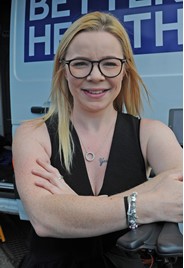 Health and well-being are important parts of the safety mix, which Centrica addresses with its ‘Health Van’.
Health and well-being are important parts of the safety mix, which Centrica addresses with its ‘Health Van’.
Run by health and safety practitioner Mikyler Fernandez-Harrison, the van travels around the country seeing up to 60 engineers a week. They are tested for height, weight, body mass index, body fat, blood pressure and hydration, and receive a report on their fitness. High blood pressure is a recurring theme.
“It’s more common than you think,” says Fernandez-Harrison. “And it’s often people who don’t think they have it. For every 10 people we diagnose with high blood pressure, seven haven’t been previously.”
Several engineers have since been put on blood pressure tablets, while a couple of drivers went for follow up tests at their GP, which picked up heart murmurs.
“It’s not just the health numbers; it’s also the conversations we have which pick up anxiety or irritable bowel syndrome – things they’ve not talked about before,” Fernandez-Harrison adds.
Driver views...
 Kirsten Clarke, smart energy expert
Kirsten Clarke, smart energy expert
How are you finding the day?
I was nervous – the pressure’s on to do well – but it’s been fun. I’ve enjoyed learning about the new vans and also doing the vehicle checks was a good reminder of everything we need to do. I’m looking forward to the Porsche experience later and also driving the truck.
Why is driving safely important to you?
On the Isle of Wight, we only have one dual carriageway so we have lots of slow and single file roads. You have to be careful. And, of course, we can see the results from the telematics.
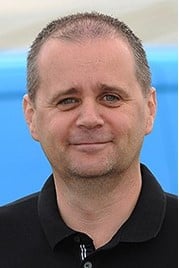 Matthew Harris, customer delivery manager and team leader
Matthew Harris, customer delivery manager and team leader
How are you finding the day?
It’s a fantastic event. My group has just driven the truck which they’ve enjoyed but the main thing is understanding the blind spots. As van drivers, they now understand what the truck driver can’t see which gives them better appreciation on the road. We’ve also done the tyres and seen the difference on braking and handling that just a small amount of under-inflation makes. If they go back to the business and speak to colleagues and they then check their tyres, it improves overall safety.
 Craig Cowper, smart energy coach
Craig Cowper, smart energy coach
How are you finding the day?
It’s brilliant. I’ve just driven the artic and driven the car with under-inflated tyres. That was an eye opener. It has also been good to get eyes on the new vans and the new racking early on.
Why is driving safely important to you?
It’s about taking pride in what you drive and protecting the company’s reputation. It’s a fully liveried vehicle and we are representing the company more when we are in the van than at any other time. It is important to take care and be courteous to other drivers.
British Gas signs major Vauxhall deal
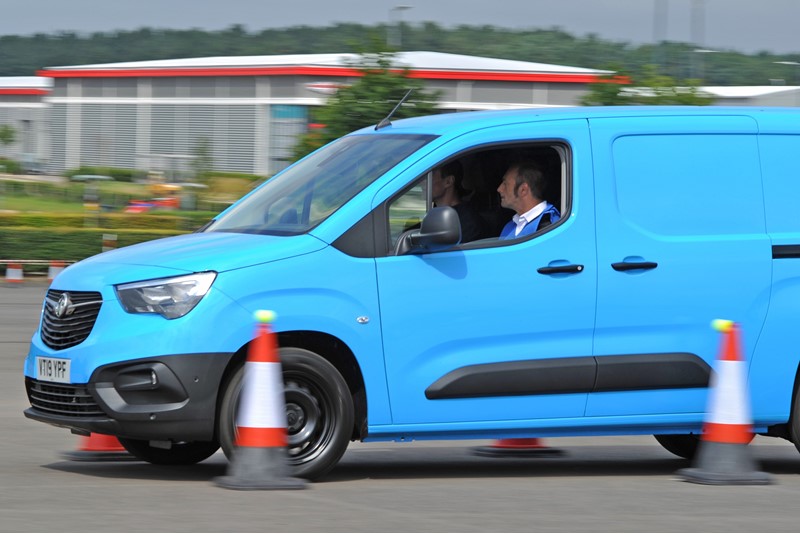 The driver of the year competition gave Centrica the opportunity to show off its new vans and its lightweight Bri-Stor racking system for the first time. The company took the decision to switch from its ubiquitous British Gas Volkswagen Caddy - which it has run since 2007 – to Vauxhall Combo following an comprehensive tender process.
The driver of the year competition gave Centrica the opportunity to show off its new vans and its lightweight Bri-Stor racking system for the first time. The company took the decision to switch from its ubiquitous British Gas Volkswagen Caddy - which it has run since 2007 – to Vauxhall Combo following an comprehensive tender process.
“We benchmarked all the vehicles out there because it is significant volume,” Steve Winter says. An order for 750 has been placed, with deliveries starting Q4; a similar number will be ordered next year.
Safety, RDE-compliant Euro6 engines, greater payload and the total cost of ownership (TCO) swung the decision in Vauxhall’s favour.
“The Combo is the first van we’ve seen with so many safety features; for example the electric handbrake which prevents vans from running away,” Winter says. “It’s a showcase of new technology for our engineers.”
He has put them on three-year leases – the Caddys were on six-year replacement cycles – with an option to extend if needed. However, that option will be invoked only if a roll-out of electric vehicles does not happen as quickly as anticipated.
“We have signed up to the EV100 group with a commitment to be fully electric by 2030 – that’s the whole fleet,” Winter says. “We are an energy company and we have a charge point business so we have to be at the leading edge. We are working with manufacturers to get a significant volume of electric vans next year – but they have to be competitive on TCO.”
His experience to date suggests they will be. British Gas has been running EVs since 2013, building a fleet of 60 vehicles over that time. Many of them are now being de-fleeted.
“When we set the TCO model in 2014, we thought the SMR cost would be 60% of a diesel van; it’s actually nearer 25%,” Winter says. “The only changes have been tyres and brakes; we’ve not had any battery or motor problems. Now we can adapt our TCO model, which makes the electric vans more competitive.”
Ironically, he has been forced to replace the electric vans with diesel due to lack of availability and because current vans do not meet British Gas specifications.
Despite the loss of the Caddy deal, it’s not all bad news for Volkswagen. A reassessment of the vehicle fleet persuaded Winter to downsize some of his larger vans to VW Transporters. Centrica has placed an initial order for 250.
“We are always looking to downsize to save cost and maintain efficiencies. The Transporters have stunning residual values so the TCO adds up,” he explains.



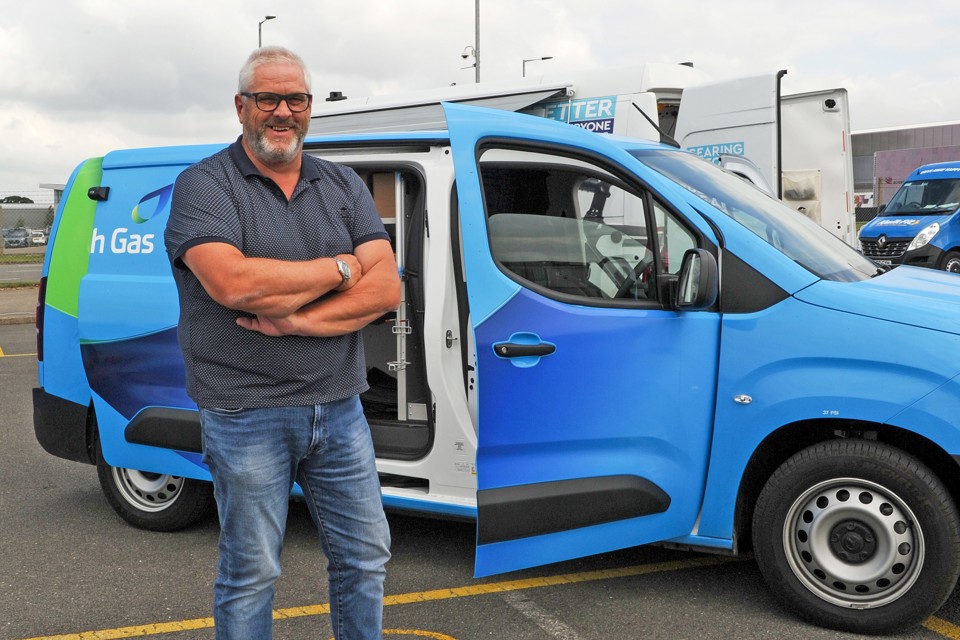
















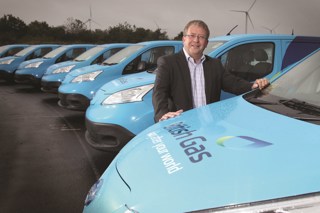
Login to comment
Comments
No comments have been made yet.